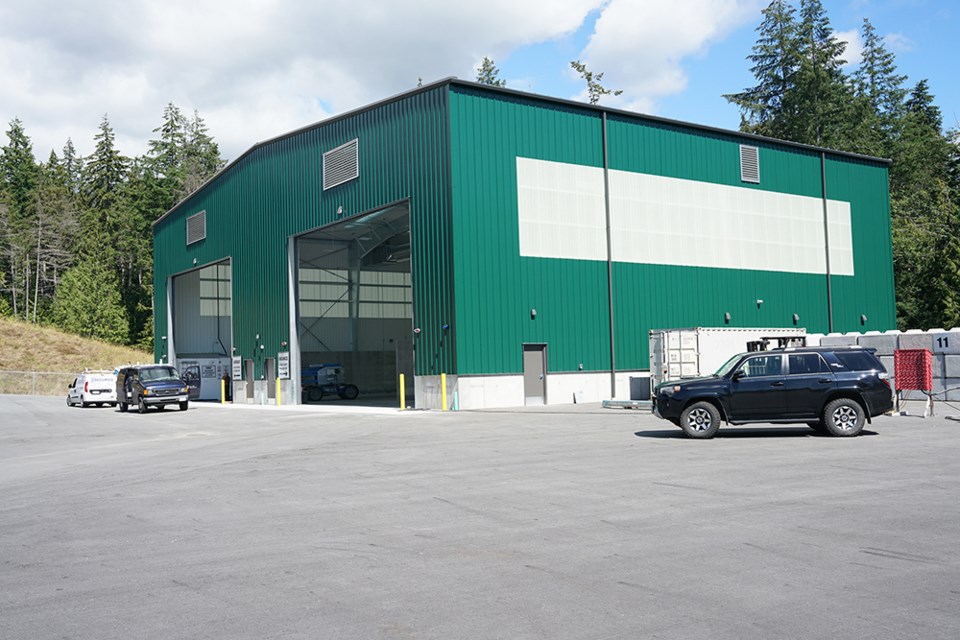qathet Regional District (qRD) directors will consider how to pay for cost overruns at the resource-recovery centre at a regional district finance committee meeting.
At the October 23 regional board meeting, directors considered a status update on the centre’s financing. qRD requires up to $2.5 million to complete the project, which could be financed through borrowing, or through use of community works funds from the regional district, and/or City of Powell River. Community works funding is provided by the federal government on an annual basis to municipalities and regional districts.
In the agenda package for the meeting was a recommendation that the board direct staff to allocate $1.4 million of regional district community resource funds towards completion of the resource-recovery centre and waste transfer station, and that the board approve additional borrowing of $1.1 million to fund completion of the centre and station over a 30-year term. The recommendation was that a loan authorization bylaw be forwarded to the November 6 regional board meeting for first three readings.
Electoral Area C director and board chair Clay Brander brought forward another motion that the city contribute $1,298,535 and the regional district provide $1,201,465 for Electoral Areas A, B, C, D and E from community works funds belonging to both governments. This would eliminate the need to borrow the $2.5 million.
“This service is used by the entire populace of the region and we would all be contributing an equitable amount of community works funding towards it,” said Brander. “This would mean we could pay off the final stages of the resource-recovery centre without increasing taxation.”
Brander said if the $2.5 million was borrowed, over a period of 30 years at an estimated five per cent interest rate, the interest would work out to just under $3.8 million. He said using community works funds would be a great way to save money and pay for it now rather than burdening following generations.
City director George Doubt said nobody likes tax increases. He said the motion he proposed at a previous meeting would have reduced the borrowing and amount of taxation, taking some money from the regional district’s’ community works funds only, which was not a happy thing for regional directors. He said Brander’s recommendation was a better solution because it reduces the tax burden on everybody that is part of the service.
“It pays off the debt faster,” said Doubt. “What this would require is the city saying yes. The end would be beneficial for the taxpayers of the whole regional district.”
City director Cindy Elliott said there was no harm in asking the city, but the problem with the ask is that the city’s community works funds have all been allocated, so the city would have to claw the money back and replace it with borrowing.
“When you look at city taxpayers, they are better off to take borrowing for a project where they are 50 per cent responsible [the resource recovery centre] than they are borrowing for 100 per cent,” said Elliott. She said if the city was to allocate the community works funding to the resource-recovery centre and borrow for other projects, the borrowing is more expensive and the city taxpayers would be 100 per cent responsible, versus 50 per cent for the resource-recovery centre.
“City taxpayers pay a higher price for that decision than everybody else, so it’s unlikely to be favoured by council,” said Elliott. “This is a delay tactic, because basically, you are asking the city to decide to increase city taxpayers’ taxes more than they would have to with another decision.”
Electoral Area B director Mark Gisborne said the proposal from Brander was not equitable, based on the amounts of community works funds the city and regional district both receive. He said that if combining the two community works funds, the electoral areas get approximately 37 per cent of the overall amount and the municipality gets roughly 63 per cent. He said dividing up the $2.5 million on that basis, the electoral area contribution should be $919,676. Using Brander’s formula, Gisborne said the electoral areas would be overpaying roughly $281,000.
“I am supportive of working out an equitable cost-sharing agreement with the municipality but I need to know the numbers a bit better,” said Gisborne. “Part of me wants to pass a motion to meet with the city about this and then also consider what these figures mean in the electoral area context.”
Electoral Area D director Sandy McCormick said the matter should go back to the finance committee because she believes it needs more thorough discussion.
After extensive discussion among directors and taking the matter to an in camera session, Gisborne made a motion to refer the matter back to the qRD finance committee. The regional board voted to do that.
Join the Peak's email list for the top headlines right in your inbox Monday to Friday.



